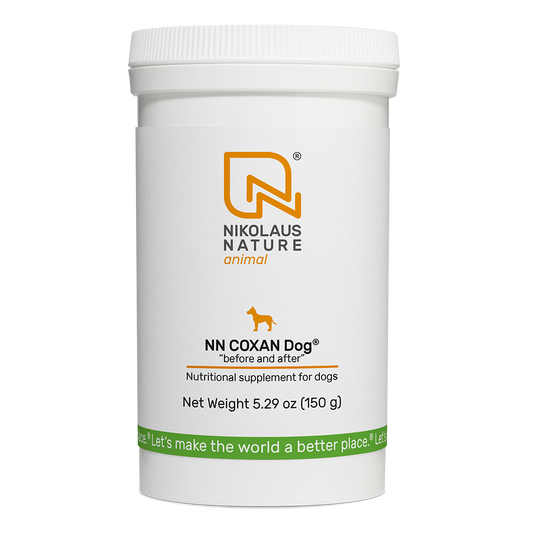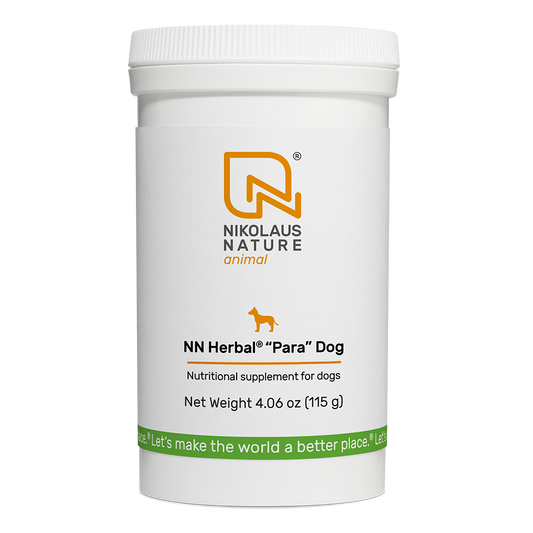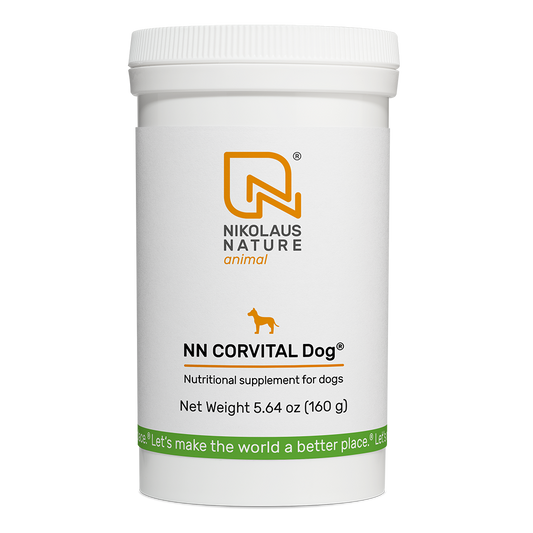The Importance of Protein in Supporting Liver Health in Dogs
Did you know that up to 80% of a dog’s liver can be damaged before they start showing any symptoms of illness? If your dog has liver disease or you want to keep their liver healthy, it’s important to understand how protein affects their liver.
Protein plays an important role in liver function. It helps with repair and regeneration while also supporting detoxification processes. However, the right balance is important. Too much protein can put stress on an already compromised liver, while too little can slow down recovery.
Keep reading to learn why protein matters, how to choose the best protein sources, and simple tips to give your dog the nutrition they need to stay healthy.

Understanding Liver Health in Dogs
The liver is one of the most hardworking and vital organs in a dog’s body, and could be considered the body’s "filter" or “chemical powerhouse.” It's the largest internal organ, situated under the rib cage, with a few distinct sections called lobes. The liver works in conjunction with the gallbladder, pancreas, and intestines to digest, absorb, and process food.
Understanding how it works and the common issues it faces can help you better care for your furry friend.
Liver’s Role in a Dog’s Body
The liver performs over 500 essential functions daily. It filters and removes toxic substances from the blood and breaks down medications. It also plays a role in processing energy, storing vitamins and glycogen, and producing bile for digestion. Additionally, it creates proteins needed for blood clotting.
The liver also plays a key role in protein metabolism. It turns amino acids into the building blocks needed for growth, repair, and immune function. While the liver can regenerate, it isn’t invincible. If it is overwhelmed by toxins, poor diet, or disease, it can struggle to function, which can affect your dog’s health.
Common Liver Issues in Dogs
Because the liver performs so many functions, any malfunction can lead to a variety of health problems. Many different conditions, both primary (originating in the liver) and secondary (caused by problems elsewhere in the body) can lead to liver disease in dogs.
Here are some of the more common liver issues:
Vessel Abnormalities
- Congenital Portosystemic Shunts (Liver Shunts): This is a birth defect where a blood vessel bypasses the liver. This prevents the blood from being filtered by the liver, allowing toxins to build up in the bloodstream. This condition is often seen in young dogs with stunted growth, seizures, or disorientation after meals.
- Acquired Shunts: Unlike congenital shunts, these develop later in life, often in older dogs. They can form due to high blood pressure in the liver, usually caused by systemic hypertension or cirrhosis.
Endocrine Diseases
Hormonal imbalances caused by endocrine diseases can lead to liver problems. Examples include:
- Diabetes Mellitus
- Hyperadrenocorticism (Cushing’s Disease)
- Hyperthyroidism
Infectious Diseases
Infectious agents, including bacteria, viruses, parasites, and fungi, can all affect the liver.
- Canine Hepatitis: This viral infection is a vaccine-preventable disease that causes inflammation and scarring of the liver.
- Leptospirosis: This bacterial infection, spread through contaminated water, can affect the liver and kidneys. It's zoonotic, meaning it can be transmitted from animals to humans.
- Coccidioidomycosis and Histoplasmosis: These are fungal infections that can affect the liver.
Liver Masses
- Liver Cysts: These are fluid-filled sacs that can be present at birth or develop as a dog ages.
- Liver Cancer: Cancer can affect the liver in two ways:
- Primary Tumors—Originate in the liver.
- Metastatic (Secondary) Tumors—Spread from another part of the body to the liver.
Breed-Specific Liver Diseases
Copper Storage Disease: Certain breeds have a genetic predisposition to this disease, where copper accumulates in the liver and causes damage. Affected breeds include Doberman Pinschers, Bedlington Terriers, West Highland White Terriers, and Labrador Retrievers.
Amyloidosis: This disease involves the buildup of abnormally formed proteins in the cells. It's commonly seen in Shar-Peis.
Chronic Hepatitis
This common liver disease is characterized by chronic inflammation. The cause is often unclear, but possible factors include genetics, copper accumulation, infections, trauma, and drug reactions.
Acute Liver Failure
This serious condition is characterized by a sudden and significant loss of liver function. It can be triggered by a sudden injury to the liver or added strain on an already compromised liver.
Hepatic Encephalopathy
This condition arises when the liver fails to filter toxins from the bloodstream effectively. This can lead to neurological problems, including seizures, disorientation, behavioral changes, blindness, and depression.

Why Protein is Essential for Liver Health in Dogs
Protein is not just a nutrient for energy—it’s a vital building block that supports your dog’s liver. Here’s how protein works its magic on the liver.
Liver Repair and Regeneration
Did you know the liver is one of the only organs that can regenerate itself, even after significant damage. This process is important for maintaining liver function and overall health.
Protein plays a vital role in liver regeneration by providing the necessary building blocks for new cells. While restricting protein intake is sometimes necessary for dogs with liver disease—sufficient protein is essential to support the healing process.
Protein’s Role in Albumin Production
Albumin is an important protein produced by the liver. It acts as a transporter for various substances in the blood, including hormones, medications, and fatty acids. Albumin also helps regulate blood volume and prevents fluid leakage from blood vessels.
Low albumin levels can lead to a condition called ascites, which is characterized by fluid accumulation in the abdomen. Adequate protein intake is necessary for the liver to synthesize albumin and maintain proper fluid balance.
Detoxification Process
The liver acts as a natural detox center for your dog, breaking down harmful substances like ammonia—a byproduct of protein metabolism. This process involves a complex series of enzymatic reactions that break down toxins into less harmful compounds.
Protein is involved in several aspects of the detoxification process. It provides amino acids that are essential for the production of enzymes involved in detoxification pathways. Additionally, protein helps transport toxins to the liver for processing.
Managing Liver Diseases with Protein
When it comes to managing liver disease, protein is both a friend and a challenge.
In cases of hepatic encephalopathy, where the liver is unable to efficiently remove toxins from the blood, restricting protein intake can help reduce the buildup of ammonia. A low-protein diet can lessen the strain on the liver and help manage neurological symptoms.
However, it's essential to note that restricting protein too severely can hinder liver regeneration and lead to muscle wasting. Therefore, finding the right balance of protein intake is important for supporting liver health and overall well-being.
It's important to work closely with a veterinarian to determine the appropriate protein intake and dietary recommendations for a dog with liver disease.
Warning Signs of Poor Liver Health in Dogs
The liver is a silent workhorse, and unfortunately, it doesn’t always give obvious signs when something is wrong—at least not right away. By the time symptoms appear, liver damage can already be significant. That’s why it’s important to recognize the early warning signs of poor liver health in dogs and act quickly.
Here’s what to look out for:
- Lethargy
- Jaundice—This is a key symptom of liver disease, characterized by a yellowish discoloration of the skin, gums, eyes, and ears.
- Weight loss
- Increased thirst and urination—While these can indicate various conditions, they are also associated with liver disease.
- Muscle wasting—This can be a sign of advanced liver disease.
- Decreased appetite
- Vomiting
- Diarrhea
- Changes in stool color—Look out for gray or yellow stools, which can indicate liver dysfunction.
- Seizures
- Disorientation—Confusion and a lack of awareness of surroundings can be signs of liver problems.
- Blindness
- Ascites—This is a buildup of fluid in the abdomen, giving it a swollen appearance. It's a common symptom of liver disease, particularly in advanced cases.
- Increased salivation
- Bloody urine or stools
- Pruritus (itching)
- Unstable walk—Difficulty walking or maintaining balance can be a sign of neurological problems related to liver disease.
Choosing the Best Protein Sources for Liver Health in Dogs
Choosing the right protein sources is important because the liver has to work hard to process proteins. You want proteins that are gentle on the liver while still providing the essential amino acids.
What to Look for in Protein Sources
- High Biological Value (HBV): Proteins with a high biological value are easily digestible and contain all the essential amino acids your dog needs. These include protein sources like eggs, chicken, and fish.
- Low Ammonia Production: The breakdown of certain proteins can produce ammonia, which can exacerbate signs of hepatic encephalopathy in the face of a damaged liver. Opt for proteins that are less likely to create excessive ammonia.
- Easily Digestible: Dogs with liver conditions may struggle to digest heavier proteins like red meat. Lighter, leaner options are better suited for their needs.
- Moderate Amounts: While protein is necessary, overloading your dog with too much can put extra stress on their liver and lead to excess ammonia production. A veterinarian can help determine the ideal amount for your pup.
Protein Sources for Dogs with Liver Conditions
Here are some specific proteinaceous foods that can support liver health while being safe and effective for dogs with liver issues.
Boiled Chicken or Turkey
Lean white meat is a top choice for dogs with liver conditions. Remove the skin and fat, and boil the meat to make it easy to digest. Avoid seasonings, as they can irritate the stomach and pancreas.
Cooked Eggs
Scrambled or boiled eggs are fantastic for liver health. They’re gentle on digestion and provide high-quality protein. Just be sure to cook them thoroughly—raw eggs can cause issues like Salmonella.
Fish
Cooked whitefish or salmon offers a double benefit: quality protein and omega-3 fatty acids, which support liver repair and reduce inflammation. Steaming or baking fish without added oil is the best preparation method.
Tofu or Lentils (in Moderation)
For dogs that tolerate plant-based proteins, tofu and lentils are excellent low-fat options. They’re not as complete as animal proteins but can be a good supplement to the diet and tend to produce less ammonia than animal-based proteins.

Cottage Cheese or Plain Yogurt
These dairy options are rich in protein and can be soothing to your dog’s stomach. Choose low-fat varieties and introduce them gradually to ensure your dog doesn’t have trouble digesting them.
Prescription Diets
There are veterinary diets specifically formulated for dogs with liver conditions. These diets include high-quality proteins, often in moderation, and are designed to reduce the liver’s workload while providing essential nutrients.
Foods to Avoid
Certain foods can worsen liver problems and should be avoided:
- Red meat is high in protein, which can be difficult for a damaged liver to process. It also tends to be high in fat, which should be limited in dogs with liver disease.
- Fatty or processed meats, including lamb, duck, pork, and offal, increase the liver's workload and are often high in copper, which can build up in the liver and cause additional damage.
- Foods high in salt can worsen fluid retention which can promote ascites in dogs with liver disease.
- Table scraps and human leftovers may contain ingredients that are harmful to dogs with liver disease. For example, some human foods contain xylitol, an artificial sweetener that is toxic to dogs.
- Foods high in copper, such as organ meats, shellfish, nuts, seeds, chocolate, and mushrooms, can cause copper to accumulate in the liver and cause damage.
Practical Tips for Supporting Your Dog’s Liver Health
Taking care of your dog’s liver is all about balance and making thoughtful choices. Optimal liver health doesn’t just happen overnight; it’s about consistent care and attention to diet, lifestyle, and overall well-being.
Here are some practical tips to help you support your dog’s liver health.
Monitoring Protein Intake for Dogs
- Work With Your Vet: Every dog is different, so ask your vet to determine how much protein your dog needs based on their liver health, size, and activity level.
- Quality Over Quantity: Focus on high-quality proteins like eggs, chicken, or fish. These are easier to digest and cause less stress on the liver.
- Portion Control: Feed your dog smaller, more frequent meals, particularly if they are experiencing symptoms of hepatic encephalopathy. This prevents their liver from being overwhelmed by a large protein load at once which can lead to increased ammonia production.
Incorporating Dietary Protein for Canine Liver Support
- Cook Lean Meats: Always cook proteins like chicken, turkey, or fish to make them easier to digest and to remove harmful bacteria.
- Rotate Protein Sources: Offering variety ensures your dog gets a full range of amino acids. For example, alternate between supplementing boiled chicken and scrambled eggs throughout the week.
- Avoid Potentially Harmful Foods: Stay away from red meat, processed foods, or anything high in fat, as these can strain the liver and worsen its condition.
- Include Liver-Friendly Carbs: Pair proteins with liver-supporting carbohydrates like sweet potatoes or brown rice. These are easy on the stomach and provide energy without stressing the liver.
Using Supplements for a Healthy Liver
Supplements can be a game-changer when it comes to liver support. They provide essential nutrients and protect the liver from damage.
- Milk Thistle: It has liver-protective properties and can stimulate detoxification and liver repair.
- SAMe (S-Adenosyl-L-Methionine): This compound plays a role in liver detoxification and may help restore glutathione levels. It is often a primary ingredient in veterinary liver support supplements.
- N-Acetylcysteine (NAC): NAC is a precursor to glutathione, an important antioxidant that helps protect the liver from damage.
- Omega-3 Fatty Acids: Found in fish oil and other sources, omega-3s can help reduce inflammation, which can be beneficial for liver health.
- B Vitamins: A B-complex vitamin supplement can support overall liver function, particularly B vitamins involved in methylation (B12, B9 and B6), a vital process for detoxification.
- Probiotics: A healthy gut microbiome can positively impact liver function. Probiotics can help maintain gut health.
- Antioxidants: Supplements like Vitamin E can help protect the liver from oxidative stress.
- Zinc: Zinc can be helpful in cases of copper toxicity, as it reduces copper absorption in the intestines.
- Prescription Supplements: Some veterinary-grade supplements are designed specifically for liver support. These are often your safest bet for long-term use.
Conclusion
Taking care of your dog’s liver health is something that can be overlooked, but it’s important for their overall well-being. Just like us, our furry friends rely on a healthy liver to process nutrients, detoxify, and stay strong. By choosing the right protein sources, monitoring their protein intake, and using liver support supplements, you can make a huge difference in their quality of life.
Remember, small changes can make a big impact. Whether you’re adjusting their diet or keeping an eye out for signs of liver trouble, you’re giving your dog the best chance for a long, healthy life.
So, what steps will you take today to support your dog's liver health? Start small, but start now—it’s worth every bit of effort.
FAQs
Can too much protein harm a dog's liver?
Yes, excessive protein can be harmful to a dog's liver, especially if the liver is already compromised. A damaged liver struggles to process large amounts of protein, which can lead to further stress and ammonia buildup.
What type of protein is easiest for dogs with liver issues to digest?
Eggs are the most easily digestible protein source for dogs with liver issues due to their high bioavailability and abundance of choline, which supports liver function. Chicken, turkey, and fish are also ideal for dogs with liver issues. These lean proteins are gentle on the liver and less likely to cause strain.
Are plant-based proteins good for dogs with liver problems?
Plant-based proteins, like peas or lentils, can be beneficial in moderation. However, dogs require animal-based proteins for a complete amino acid profile, so plant-based proteins should not be the primary source.
How does protein help detoxify a dog’s liver?
Protein plays a vital role in detoxifying the liver by providing the necessary amino acids to produce enzymes that break down toxins and remove them from the body. The liver also converts ammonia, a waste product from protein metabolism, into urea, which is then excreted by the kidneys.
Should dogs with liver issues avoid red meat?
Yes, dogs with liver issues should avoid red meat. Red meat is high in fat and copper, which can be difficult for a damaged liver to process.
Sources:
- Liver Disease, https://www.veterinary-practice.com/article/what-to-do-if-you-suspect-liver-disease
- Congenital Portosystemic Shunts in Dogs, https://pmc.ncbi.nlm.nih.gov/articles/PMC9961057/
- Amyloidosis in Animals, https://pmc.ncbi.nlm.nih.gov/articles/PMC3329740/
- Ascites is a negative prognostic indicator in chronic hepatitis in dogs, https://pubmed.ncbi.nlm.nih.gov/19175722/
- Hepatic encephalopathy in dogs, https://pubmed.ncbi.nlm.nih.gov/27060899/
- Nutraceuticals for canine liver disease: https://pubmed.ncbi.nlm.nih.gov/23890245/
- Nutritional Considerations for Dogs and Cats with Liver Disease, https://pubmed.ncbi.nlm.nih.gov/26606205/







